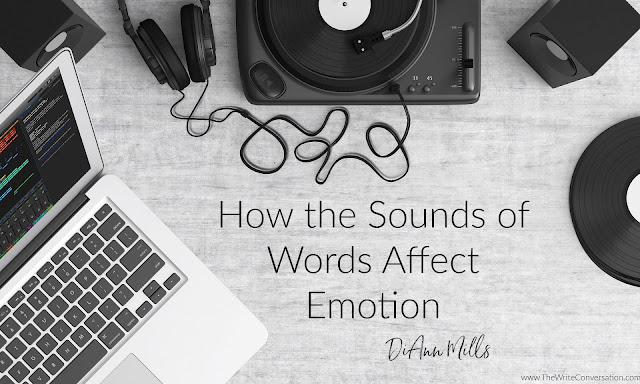by DiAnn Mills @DiAnnMills
Our ancestors struggled to develop language and communication skills. I imagine the beginnings of those grunts were emotionally motivated.
- Ugh! A dinosaur is coming.
- Ah. The scent of a spring morning.
- Mmm. The food smells good.
- Ohhhh. I hurt
Over time, words grew out of necessity and a need to communicate effectively. Sounds and meanings were emotionally connected then and are today. The sound of a word doesn’t necessarily tell us what it means, but we can project to the listener what it means by the way it affects us emotionally. For example, a mother tells her baby who doesn’t have a grasp of language “No.” The emotion the mother uses shows her baby the negative connotation of the word.
We communicate through verbal and nonverbal means. Body language has been estimated at 70 - 90% of our communication. However blind people have an emotional reaction to words, and that indicates our body language may or may not influence how a phrase or word is interpreted emotionally
Writers enhance the reader’s adventure through the word’s spelling, context, and rhythm. The sounds of our words evoke emotion, mood, setting, and genre due to the way they flow from our mouths. The study of word sounds can be a euphony—pleasing to the ear. Those sweet sounds and words make us smile. Or sounds can be a cacophony—harsh to the ear. Those sounds can disturb, frighten, or just annoying.
So how does a writer use euphony and cacophony to affect a character and influence reader?s
To ease the heart and mind of a character, use words with long vowels and soft consonants. Words with long vowels sounds can calm the reader and relax them. Those with soft consonants are easier to say and soothing to the ear.
- Oh, honey.
- You have my love.
- You can join our fun.
To create an element of disturbance, use hard consonants, especially with words containing lots of T, K, and P. The emotional stress will rise in the character and the reader.
- Keep out.
- Jerk.
- I’ll kill you with this pitchfork.
Many words ending with “y” are light, even fun.
- Pretty
- Dainty
- Lovely
- Cheery
In writing romance, create phrases of beauty, love, and longing. The words alone speak of the character’s feelings. The rhythm of our sentences often causes emotive responses. Short sentences tend to speed up the action and pacing. Long sentences slow the pace and can relax the reader.
The use of symbols, tangible items that psychologically mean something else can establish emotional levels. For example: a cruel father who uses a belt to discipline a child may grow into an adult and still experience fear at the sight of a belt. Another example: a mother who makes hot chocolate for a child who’s had a rough day often means the adult will long for hot chocolate after experiencing a difficult day.
For the writer who is looking to develop a unique character, consider Misophonia. This is a condition in which a person can become furious at the sound of certain words. To cope, these people may need counseling or ear-cancelling earphones to balance their emotional reactions. Misophonia triggers might include the sound of someone chewing food or gum, ticking of a clock, loud music, and etc.
Writer, read your passages aloud or use text-to-voice. Are the emotions evident and engage the reader to continue turning pages?
TWEETABLE
DiAnn Mills is a bestselling author who believes her readers should expect an adventure. She creates action-packed, suspense-filled novels to thrill readers. Her titles have appeared on the CBA and ECPA bestseller lists; won two Christy Awards; and been finalists for the RITA, Daphne Du Maurier, Inspirational Readers’ Choice, and Carol award contests.
She is the former director of the Blue Ridge Mountain Christian Writers Conference, Mountainside Marketing Retreat, and Mountainside Novelist Retreat with social media specialist Edie Melson. Connect here: DiAnnMills.com


This is so fascinating, DiAnn. Thank you for sharing such great info!
ReplyDeleteThank you, Crystal!
DeleteGreat article!
ReplyDeleteThank you so much!
DeleteLovely! Thank you.
ReplyDeleteAppreciate your kind words!
ReplyDeleteInteresting and helpful. Thank you, DiAnn.
ReplyDeleteThanks, Katherine. Glad to help!
DeleteThis a great article but it leaves me wanting more! Are there books particularly on this subject of the emotive use of vowels and consonants? What genre would this constitute?
ReplyDelete